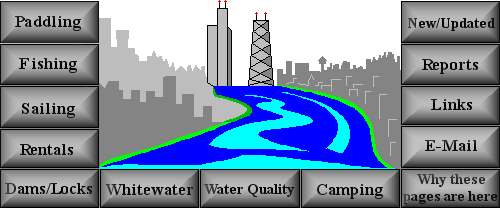
| Canoeists, beware! (Water quality treatment varies with the seasons in in Illinois) By: Donald H. Schueman |
| We are not responsible for errors or omissions. When boating, regardless of water depth, wear a PFD! |

| Canoeists, beware! (Water quality treatment varies with the seasons in in Illinois) By: Donald H. Schueman |
| We are not responsible for errors or omissions. When boating, regardless of water depth, wear a PFD! |
This article appeared in an edition of the Prairie State Canoeist Newsletter. I have received permission from the author to publish it here as it contains information that is important for all of us to be aware of.
Note: Important fish consumption information (referred to below) can be found on the Illinois Department of Natural Resources web site. You'll need Adobe Acrobat to read the Group I, II, & III consumption guidelines.
Paddlers exploring Illinois rivers may be under the impression that sewage treatment plants always disinfect their effluents before release to our rivers. Several years ago, to reduce the amount of chlorine (toxic) added to the river systems the State Pollution Control Board changed the responsibility of the treatment plants so that they would not have to disinfect the water for fecal coliform and its accompanying bacteria, viruses and parasites during what they perceived as the non-recreational period of the year; Nov. 1st through the last day of April. The volume of effluent added to a river can be appreciable. The DuPage River at low flow receives 37% of its flow from sewage treatment plant effluent. The increased risk of the non-disinfected sewage flow should be of concern to every paddler paddling in March, April and early May the most popular paddling months of the year. (or those hardy souls who do winter paddling.)
This change in the disinfection of sewage came to light at a watershed planning conference. I was complaining about the incomplete data I was receiving from the sewage treatment plants that I monitor on the DuPage for the DuPage River Coalition. What I had thought was a change in reporting obligations by the STPs turned out to be the complete absence of disinfection of the effluent of the 17 major plants on the DuPage river.
Several other revelations of the day; of importance to any one traveling the rivers of Illinois are:
Illinois treatment standards regarding disinfection differ from one part of the state to another. It is unlikely that we can be sure that a river is being disinfected from our canoes. It is also unlikely we will know when the river on which we are traveling in early May is flushed clean (in the eddies especially), after six months of untreated sewage flowing in the river.
Paddlers frequenting the South Bend whitewater course during low flow periods in late summer report nasal infection and flu like symptoms that persist for a lengthy period after contact with the water of that facility.
A Chicago paddler contracted a reoccurring illness, called histoplasmosis, during kayak rolling sessions at Beck Lake. The fungus spores found in the geese droppings (in the water) brought on the disease, which seriously threatened his health and took his doctor almost a year to diagnose.
Though the examples are unrelated to Illinois sewage treatment, the threat of untreated sewage suggests new additions to the medical kits of paddlers to protect against the dangers of contact with river water throughout the year. Hazards such as untreated livestock runoff, septic system seepage into field tiles draining into the river and the incomplete effects of chloridation (even when it is being applied) should be a year round concern to all of river users. (see sidebar on water safety for paddlers)
From the book The Clean Water Act 20 Years Later, published by the Natural Resources Defense Council a survey quoted on page 38 of the book states:
The threat is real and paddlers responsible for other family members should take the new changes in sewage treatment into consideration. The information and warning here is for the well being of paddlers. And the recommended procedures are only an opening for discussion of what is the best and safest way to treat river water that we come in contact with, incidentally or through the occasional upset which paddlers experience. There are some people allergic to certain antibiotics and chemicals. These factors must influence the families choices of what to put in their medical kits and the products named in the sidebar are examples only of products used by others. Check with your doctor if allergies are a problem, suggest a test of products new to your kit and ask your doctor how to go about it.
Before handling food or caring for others.
Use discretion if someone in your family has a weak immune system when choosing to canoe a river that is not being disinfected.